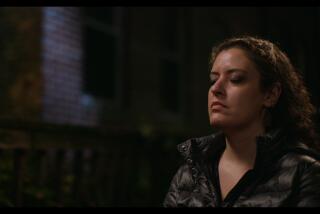Show Offers New Yorkers a Platform for Their Pain
- Share via
NEW YORK — “Patricia” is on the phone and she’s sobbing. And viewers of the NY1 News cable channel are listening as she pours out her fears, while two Catholic Charities counselors sitting in the TV studio nod in sympathy.
A few days after the Sept. 11 terrorist attacks brought down the World Trade Center, Time Warner Inc.’s local news channel, normally a mix of such municipal staples as mayoral campaigning and restaurant reviews, opened phone lines for an hour each weekday to let callers unburden their souls to a rotating cast of psychologists.
New York is satirized as a city of neurotics, but the anguish in the calls isn’t the Woody Allen self-scrutinizing variety. It’s much more basic. The show’s viewers are witnessing a spectrum of pain, grief and anxiety that has engulfed the city’s psyches, from the loss of loved ones to the fear triggered by the sound of an airplane overhead, even the sense that nothing much makes sense anymore.
In agonized tones, “Patricia” tells anchor Sharon Dizenhuz about the despair that has overwhelmed her since the attacks. “I feel so helpless. I lost my parents, and I never felt like this.”
Catholic Charities counselor Ellen Shuman takes the practical approach: “One of the things you can do is to help someone else.” Colleague Ingrid Seunarine tells her in a soothing voice: “We are all overwhelmed at this time. It’s OK to cry. It’s a way of showing loss.” She suggests that the caller write letters to herself to talk through her fears.
The show, which is about as visually exciting as watching radio, started as a way for NY1 to stay on the air live to accommodate the unending flow of breaking news and give its small staff a break. In normal times, the channel airs, at most, three hours of live programming a day; the rest is taped in advance.
A therapy call-in show seemed obvious, says Steve Paulus, NY1 News’ senior vice president and general manager. “New Yorkers are full of angst to begin with. There’s this idea that everyone in New York is in therapy and has a therapist, but it’s not true. People need someone to talk to; people don’t know where to turn.”
Weeks later, the calls haven’t stopped lighting up the switchboard.
They come in to the darkened control room 20 seconds after the show’s telephone number is posted on-screen, and almost immediately every button is blinking bright yellow.
Rescue workers call and break down on air; a woman wants to know how she can possibly go on with her life with her nephew still missing and presumed dead. “Deborah” pours out her vivid nightmare. “Melody” says, “Every time I hear a plane, I’m very, very afraid.” She’s followed by another “Melody” who is “supposed to go to Vegas in two weeks, and I’m kind of scared to get on the plane.” Many callers wonder what to tell their children, including one who witnessed the events and now sees “smoke” in every puff of cloud.
A viewer in Kansas--NY1 News has aired on other Time Warner cable systems since the hijackings--wants to talk about her daughter, who survived the attacks. Some callers are extraordinarily frank. One is “afraid to take any car services or taxis because the nationalities of [the drivers] are all Arabic. . . . I’m not trying to be racist, I love all nationalities; but after this happened, you just never know.” And then there’s “Shauna” from Manhattan, feeling paranoid and having nightmares, who wants advice on whether to see a “psychologist or a psychic.”
Dizenhuz, who normally covers theater news for the channel, has found herself discussing whether Zoloft is an antidepressant or an anti-anxiety drug. She had never done a call-in show before, but as the daughter of a child psychologist, she says she was familiar with the language of therapy.
But the role of confessor is new. Although journalists are trained to step back and not get emotionally involved in their subjects, she says, “Anyone who has a soul wants to feel they are doing something.” Her job now, she says, is “to give support. You just focus on the fact that you’re a human, and this person who’s calling is hurting, and I have people sitting next to me who can help.”
At the end of the hour each day, there are callers who haven’t been able to ask their questions. Executive producer Tara Alexander often calls them back with crisis center referrals; one day she spent 90 minutes talking to three of them. “This is almost therapy for me,” she says.
The show, which will air at least through next week, is drawing about 2% of the viewers who have their TV sets on in the New York metro area; normally, the channel’s viewership at that hour doesn’t even register in the ratings.
More to Read
The complete guide to home viewing
Get Screen Gab for everything about the TV shows and streaming movies everyone’s talking about.
You may occasionally receive promotional content from the Los Angeles Times.






